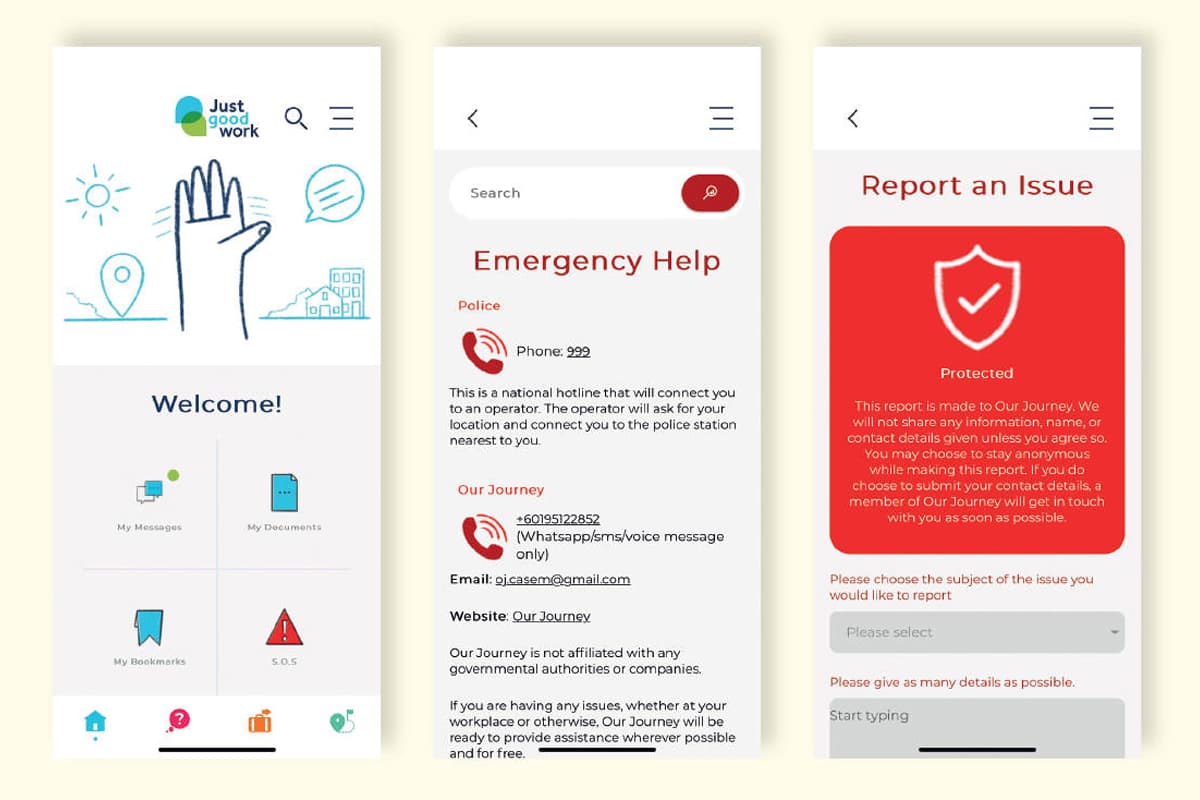
This article first appeared in The Edge Malaysia Weekly on March 20, 2023 - March 26, 2023
The poor living conditions and unequal treatment of migrant workers in Malaysia have come under increasing scrutiny in recent years. In response, various efforts have been made to empower these foreign workers to speak up if they are exploited without fear of retaliation.
A common solution for companies is to establish grievance channels for migrant workers so that they can voice their complaints safely and for these to be handled fairly. However, challenges abound. Are the workers aware of their rights in the first place, and what safeguards are there to ensure anonymity?
Our Journey, a non-governmental organisation (NGO) in Malaysia, launched the Just Good Work app in 2019 to address these issues. The NGO, which advocates the development of a supportive migration system for non-citizens, is led by founder and director Sumitha Shaanthinni Kishna.
The app enables migrant workers to make reports directly to the NGO through voice and text messages. Users can also securely store photos of their important documents, like their job offer and recruiter receipts, on the app.
“When we developed the app, we ensured that it would be accessible to all migrants ... It doesn’t need any sort of registration, except for their age and the sector they are working in. The app is currently available in eight different languages with an audio feature to allow those who are unable to read to listen to our content,” says Sumitha.
The International Organization for Migration reported that between 2018 and 2020, the Malaysian government estimated that the country hosted 1.4 million to two million documented migrants and 1.2 million to 3.5 million undocumented migrants. This makes Malaysia one of the largest migrant-receiving countries in Southeast Asia.
Just Good Work was originally developed by UK-based social enterprise, Fifty Eight, for a Kenyan worker in Qatar. Our Journey received a grant from the UK government to adopt the app locally and educate migrant workers on how to use it. According to Sumitha, the app currently has almost 5,000 users and 9,000 downloads.
A grievance mechanism provides a transparent framework for addressing grievances in the recruitment process and at the workplace. Usually, such mechanisms take the form of an internal procedure for complaints, followed by consideration, management response and feedback.
In Malaysia, the app was first introduced to workers in two rubber manufacturing companies due to the uproar over the mistreatment of migrant workers in that particular industry last year.
While most companies in Malaysia have internal grievance channels, as does the Ministry of Human Resources, all these lack a few key components for migrant workers to reach out to the authorities, observes Sumitha. For one, it is only available to documented workers.
Undocumented workers often fall through the cracks, she says. Additionally, the grievance mechanism only provides a channel for workers to make complaints but does not educate them on their rights. “On the contrary, our app has a lot of information about work and law,” she says.
The Just Good Work app can be downloaded through a low-bandwidth internet connection and does not require any additional personal information or documents from its users. This is to provide equal opportunity for illegal and undocumented immigrants to report any exploitation.
Safeguarding workers’ identities
Most migrant workers are afraid to complain about their employers for fear of losing their jobs. But Our Journey ensures the aggrieved worker’s identity is kept confidential when liaising with employers upon a complaint.
“We usually tell the employers that we are unable to reveal the details. And because I introduce myself as a lawyer in the email I send, employers generally know that I am reaching out to resolve the issue amicably. In most cases, it gets the deed done,” says Sumitha.
Most companies would rather deal with an NGO advocating labour rights instead of the Department of Labour Peninsular Malaysia (JTK).
“Employers know that we don’t have the authority to question them, but that has changed now because JTK receives complaints from civil society as well. So, given the kind of circumstances at work, the employer knows that if it does not respond [to us], we will subsequently write to JTK,” she says.
A frequent problem Sumitha has observed from the phone calls and complaints by undocumented migrant workers is a lack of proof. It is difficult to approach employers when there is not enough evidence, especially in circumstances where there is a movement restriction or curfew for workers living in hostels or staff quarters.
“When they [migrant workers] seek help, it becomes difficult when they don’t have a payslip; for instance, in a case of underpayment. When I request such documents, it is because [we want] evidence. So, I always tell them to keep their payslips even though they have good employers because this had happened too many times (in the past),” laments Sumitha.
Currently, the organisation is expanding to help migrant workers in the palm oil and garment industries. The US Department of Labor has given a grant to Our Journey for this project, which includes fine-tuning the app to add relevant legislation and information that will apply to foreign workers in these sectors. The update includes adding Tamil as another language feature on top of the existing ones in the app.
Save by subscribing to us for your print and/or digital copy.
P/S: The Edge is also available on Apple's AppStore and Androids' Google Play.
